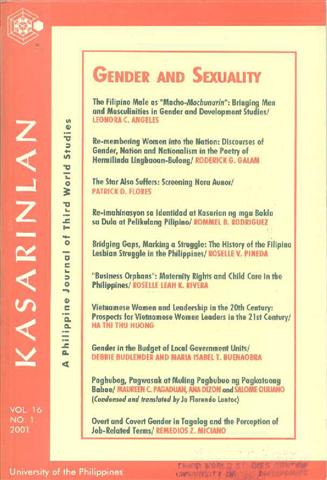Re-membering Women into the Nation: Discourses of Gender, Nation, and Nationalism in the Poetry of Hermilinda Lingbaoan-Bulong
Abstract
Nationalism has proven to be male-biased and this is evident in its tendency to image the nation as woman/mother in language, It has conveniently placed women where it is almost completely nowhere to be read, dismembered from the national body and denied agency and meaningful participation, When written of, women are assigned to the concepts of nation and mother as is the case of "Inang Bayan," In this nation, the citizen is male and the state masculine, Consequently, the experience of a nation in the context of colonialism and imperialism is semanticized as rape which further reinforces the gendering of the nation as woman, Through poetry, Hermilinda Ungbaoan-Bulong creates spaces for women in the narrative that is nationalism, In [i]"Madre Abre"[/i] and [i]"Baro a Kaputotan,"[/i] Ungbaoan-Bulong's feminized territory represents ethnicity belonging to a wider community or territory, She encourages women to remember their own strength, their own capacity, their place in the pages of history and reminds them that they are daughters of freedomfighter Gabriela Silang in [i]"Agtnangka, Babai,"[/i] In reconstructing the family as a unit wherein there are no subordinates; she rescues the domesticity of women in the home where she rules a "queendom" bereft of power and authority, In [i]"Maria Filipina[/i], " the commodified overseas contract workers (OCW) more popularly known as the Japayuki are "beings-for-others" responsible for saving the country from
economic ruin on a regular basis, By locating women in specific historical, political, cultural, social and economic processes, Lingbaoan-Bulong elevates the nationalistically marginalized Filipino women to agents of social and national transformation.
Published
2008-09-18
Section
Features
Keywords
Nation; Nationalism; Poetry; Women; Gender; Hermilinda Bulong
By submitting a manuscript, the authors agree that the exclusive rights to reproduce and distribute the article have been given to the Third World Studies Center.



